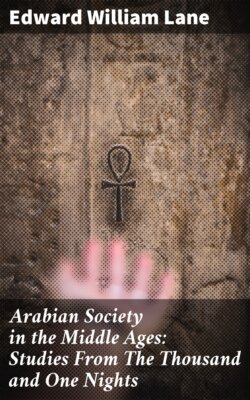Читать книгу Arabian Society in the Middle Ages: Studies From The Thousand and One Nights - Edward William Lane - Страница 7
На сайте Литреса книга снята с продажи.
FOOTNOTES:
ОглавлениеTable of Contents
[1] See below, 25 ff.
[2] An Apostle is distinguished from a mere Prophet by his having a book revealed to him.
[3] I use two words (perhaps the best that our language affords) to express corresponding Arabic terms, which some persons regard as synonymous, but others distinguish by different shades of meaning. On what I consider the best authority, the word which I render "fate" respects the decrees of God in a general sense; while that which I translate "destiny" relates to the particular applications of those decrees. In such senses these terms are here to be understood when separately employed.
[4] Ḳur-án, xiii. 39.
[5] El-Insán el-Kámil, by ´Abd-El-Kereem El-Jeelee, quoted by El-Isḥáḳee in his account of Ibráheem Pásha el-Maḳtool.
[6] Mishkát el-Maṣábeeḥ, i. 26–34, 373. [Cp. S. Lane-Poole, "The Speeches and Tabletalk of the Prophet Moḥammad" (1882), 180–182.]
[7] Nuzhet el-Mutaämmil wa-Murshid el-Mutaähhil, section 7.
[8] Mishkát el-Maṣábeeḥ, ii. 381.
[9] For a translation of the whole of this prayer, see my "Account of the Manners and Customs of the Modern Egyptians," ch. xxv.
[10] Ḳur. v. 35.
[11] For a fuller account of the prayers, see "Modern Egyptians," ch. iii.
[12] The Iḳámeh: see below, ch. viii.
[13] [For the collected legislation of the Ḳur-án, see my "Speeches and Tabletalk of the Prophet Moḥammad," 133 ff. S. L-P.]
[14] Among a people by whom falsehood, in certain cases, is not only allowed but commended, oaths of different kinds are more or less binding. In considering this subject we should also remember that oaths may sometimes be expiated. There are some oaths which, I believe, few Muslims would falsely take; such as saying, three times, "By God the Great!" (Wa-lláhi-l-´aẓeem), and the oath upon the muṣḥaf (or copy of the Ḳur-án), saying, "By what this contains of the word of God!" This latter is rendered more binding by placing a sword with the sacred volume, and still more so by the addition of a cake, or piece of bread, and a handful of salt. But a form of oath which is generally yet more to be depended upon is that of saying, "I impose upon myself divorcement!" (that is, "the divorce of my wife, if what I say be false!"); or, "I impose upon myself interdiction!" which has a similar meaning ("My wife be unlawful to me!"); or, "I impose upon myself a triple divorcement!" which binds a man by the irrevocable divorce of his wife. If a man use any of these three forms of oath falsely, his wife, if he have but one, is divorced by the oath itself, if proved to be false, without the absolute necessity of any further ceremony; and if he have two or more wives, he must under such circumstances choose one of them to put away.
[15] [But see my "Speeches and Tabletalk of the Prophet Moḥammad," 139, S. L-P.]
[16] Ḳur. v. 49.
[17] Hence it has been called, by many travellers, and even by some learned Orientalists, the Great Feast; but it is never so called by the Arabs.
